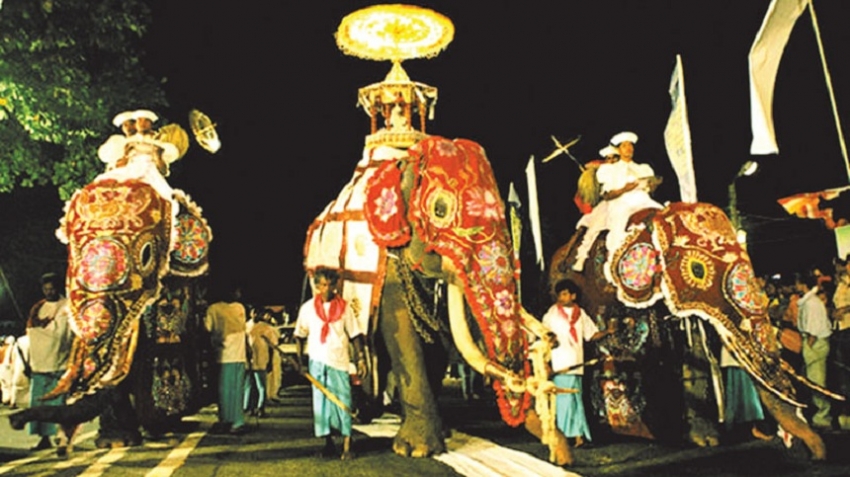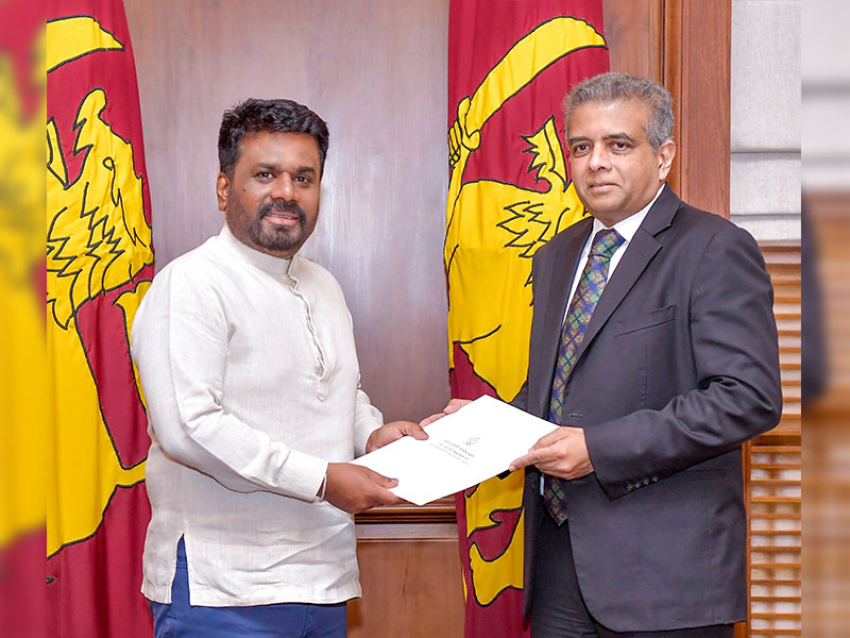A multitude of religious offerings in the Buddhist faith dominates the calendar of Buddhist events in Sri Lanka each year, giving pride of place to the Full Moon Poya days in the months of Duruthu, Nawam, Vesak, Poson, Esala, Nikini, Vap and Unduwap.During these Full Moon days, the arrival of Lord Buddha in Sri Lanka; the entry of two leading disciples into the Buddhist order; the commemoration of the Buddha’s preaching to his father; the birth, enlightenment and parinibbhana of the Buddha; the introduction of Buddhism to Sri Lanka; the conduct of the Buddha’s first discourse (sermon) to the ascetics; the conclusion of preaching of Abhidhamma; the obtaining of vivarana; and the bringing of the ‘Jayasri Maha Bo’ sapling to Sri Lanka are remembered with devotion by members of the Buddhist community in Sri Lanka. Of them, the month of Esala is of special significance and prominence to the Buddhists since the royal spectacle in the upcountry, the Sri Dalada Perahera (pageant) fascinates all walks of life and is revered by thousands who converge on the streets of the hill capital.
This is indeed a seasonal commemoration that paves the way for both Buddhists and Hindus alike to recall the spiritual significance attached to multiple forms of veneration, pageants (perahera) and poojas in Sri Lanka. For Buddhists, the Great Renunciation of Prince Siddhartha in search of the eternal bliss of truth; the conduct of the Buddha’s first Dhammachakka Pavattana Sutta discourse; the conception of Prince Siddhartha in Queen Mahamaya Devi’s womb; the performance of twin miracles (Yamaka Maha Prathiharya); the preaching of Abhidhamma to the devas in Thavuthisa heaven; the first local ordination of the first Sri Lankan into monkhood in Anuradhapura; the foundation-laying for Ruwanweli Seya and its enshrinement of relics; the great revival of Theravada Buddhist reformation at Malwathu Viharaya and a few other milestone events in the Buddhist calendar necessitate them to recall those sacred memories with devotion and veneration.
More significantly, the Esala Full Moon Poya assumes prominence since it heralds the onset of the rainy retreat of the monks, popularly called the Vas season, which is held across the country on a grand scale. It is owing to this combination of commemorative events that Buddhists fittingly observe this day ceremonially with the perahera, giving pride of place to the historic Sri Dalada Perahera in Kandy. In fact, legends also speak of how the Sacred Tooth Relic was also placed for public veneration in Kandy on an Esala Full Moon Day.
Parallel to the great spectacle in the hill country, many leading Buddhist places of worship across the island are in the practice of holding colourful peraheras with pageantry, including hundreds of dances, caparisoned tuskers, and decorated floats. Of them, the Kataragama, Devinuwara, Aluth Nuwara, Bellanwila and Kotte pageants are leading since those cultural processions are of grand nature and crowd-pullers.
The Bellanwila Esala Festival began in earnest in 1950 as a form of offering to the Buddha and the deities in response to an unfortunate cattle epidemic that pervaded Bellanwila and its suburbs, claiming the lives of hundreds of farming cattle and driving innocent farming communities and villagers into desperate straits of economic hardships at that time. The late Ven. Bellanwila Sri Somarathana Nayake Thera, the Chief Incumbent of the Bellanwila Raja Maha Viharaya at that time, was much disturbed about what was going on in the area and summoned everyone to the temple, where a sacred sapling of the Jaya Sri Maha Bodhiya remains planted for generations.
This far-sighted Thera conducted minor processions for three days around the temple and made special offerings to the Bodhiya pleading for an immediate end to this tragedy and urging God Vishnu to eradicate the epidemic and bless the village. Surprisingly, his and villagers’ offerings worked well and the situation dramatically improved to the satisfaction of the villagers. That was the time when the Esala Perahara Festival was initiated in Bellanwila, which has now grown to be one of the mammoth Esala spectacles in the country. The late Ven. Somarathana Nayake Thera developed the temple premises from its humble beginnings to what it is today and continued this Esala pageant up until his demise in 1984.
The Bellanwila Esala Perahera in 2019 is being organised under the auspices of Ven. Dr. Bellanwila Dhammarathana Nayake Thera, Chief Incumbent of the Bellanwila Raja Maha Viharaya and the Chief Sangha Nayake of Singapore, after the untimely death of Ven. Professor Bellanwila Wimalarathana Anu Nayake Thera in February last year. Ven. Wimalarathana Anu Nayake Thera’s dedication and commitment to the annual spectacle brought it to new heights and began to receive state patronage.
The Bellanwila Festival in keeping with age-old traditions and practices observed at Sri Dalada Maligawa and elsewhere, prioritises the veneration of the Buddha with a week-long pirith chanting, through which the entire country and her people are blessed. The Festival began after the planting of the symbolic kap on Wednesday, August 14, and the conducting of Dorakada Ashna Anushasana and the Deva Dutha Perahera, which again invoked the blessings of Triple Gem on all Sri Lankans and people at large on Saturday (17).
The four Mal Peraheras (pageants of flowers) that took place in the temple premises this year on four consecutive days (August 18–21) symbolised the offerings to the Buddha before the remainder of pageants began parading the area. This year, the Pawada Perahera, which is regarded as one of the most sacred, took place yesterday (22) amid a huge gathering of devotees, in which the relic casket of the Buddha and the replicas of deities were carried on the head atop paavada (white carpets) spread along the way.
The Ransivili Perahera that parades around the Bellanwila village, reminding the villagers of ancient practices, will be held today (23) with many dancing troupes and elephants. The finale of the Festival, the Randoli Maha Perahera, the highlight with hundreds of dancers, drawn from many corners of the country, is scheduled to proceed along the Dehiwala - Mahargama road (Professor Bellanwila Wimalarathana Mawatha), Bellanthara - Pepiliyana road and Vihara Mawatha on Saturday (24), before it wends its way back to the temple premises.
The Chief Incumbent, Ven. Bellanwila Dhammarathana Nayake Thera dedicated to upholding all traditions and conducting the Esala Perahera on a grand scale, has decided to add several new features to the perahera this year too as a tribute to both the late Ven. Somarathana Nayake Thera and late Ven. Professor Bellanwila Wimalarathana Thera, the latter who did his best to conduct this mammoth festival uninterrupted, after the demise of his great teacher, late Ven. Somarathana Nayake Thera. The final Randoli Maha Perahera which will have many caparisoned elephants and dancing groups is indeed one of the most spectacular and colourful pageants in the country.
The whole of the arrangement is lavishly supported by resident monks – Ven. Boralesgamuwe Pemarathana Thera, Ven. Udugampola Hemarathana Thera, Ven. Bellanwila Sangharathana Thera and the Esala Perahera committee, the Dayaka Sabha, Kulangana Samithiya, Buddhist youths organisations, the Community Development Foundation, Tharuna Sansadaya, Buddhists across the country, donors and many from the other faiths.
The Bellanwila Esala Festival culminates on Sunday (25) with the ancient water-cutting ritual and the Deva Daana (almsgiving) offered both at the Boralesgamuwa and Bellanwila temple premises, before the final Shanthikarma ritual invokes blessings on everyone. The Deva Daana will be offered to thousands by the Boralesgamuwa Pararthasadaka Awamangalyadara Association and Boralesgamuwa villagers at the water-cutting location.
Bellanwila Randoli Maha Perahera parades tomorrow Featured
August 23, 2019



















